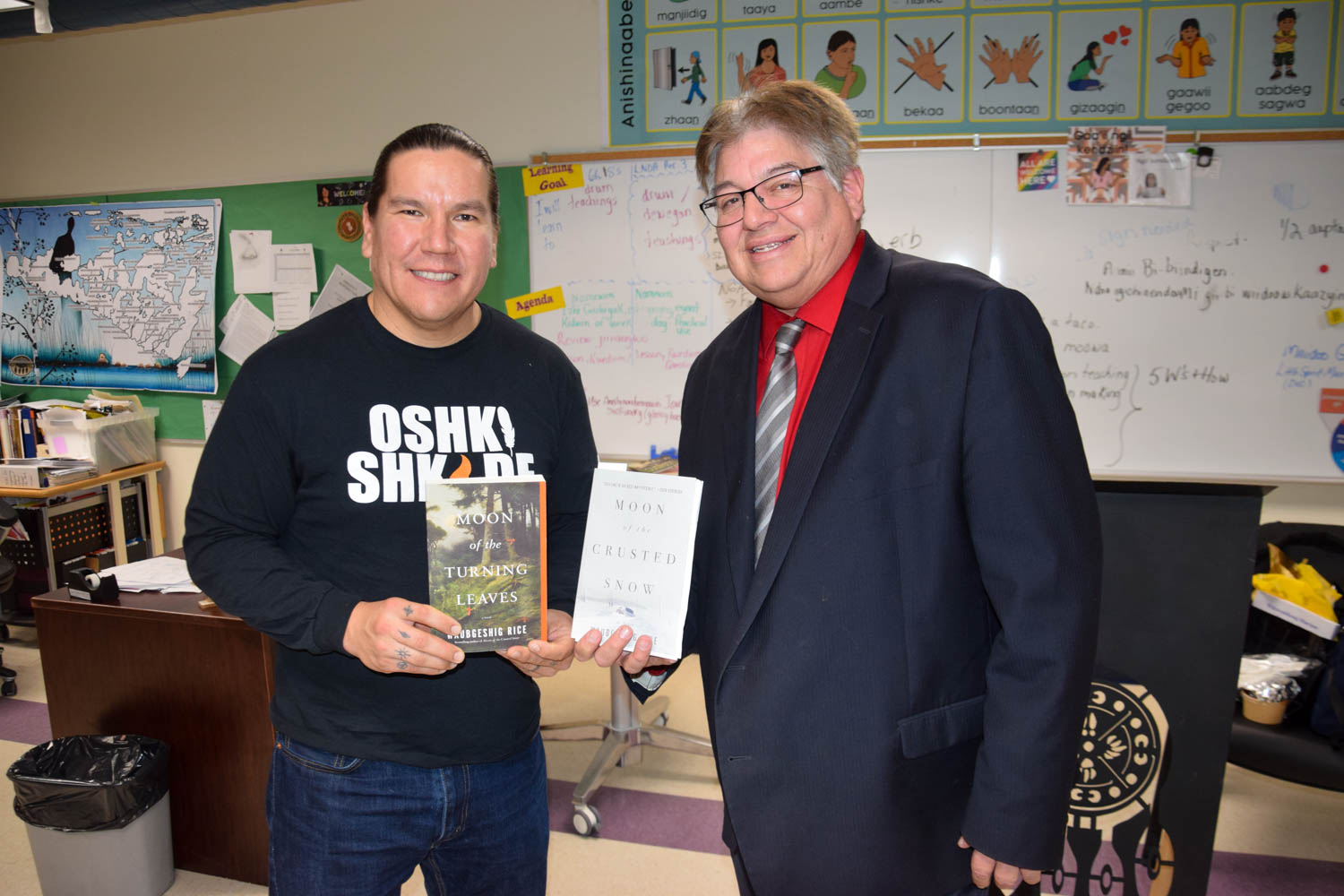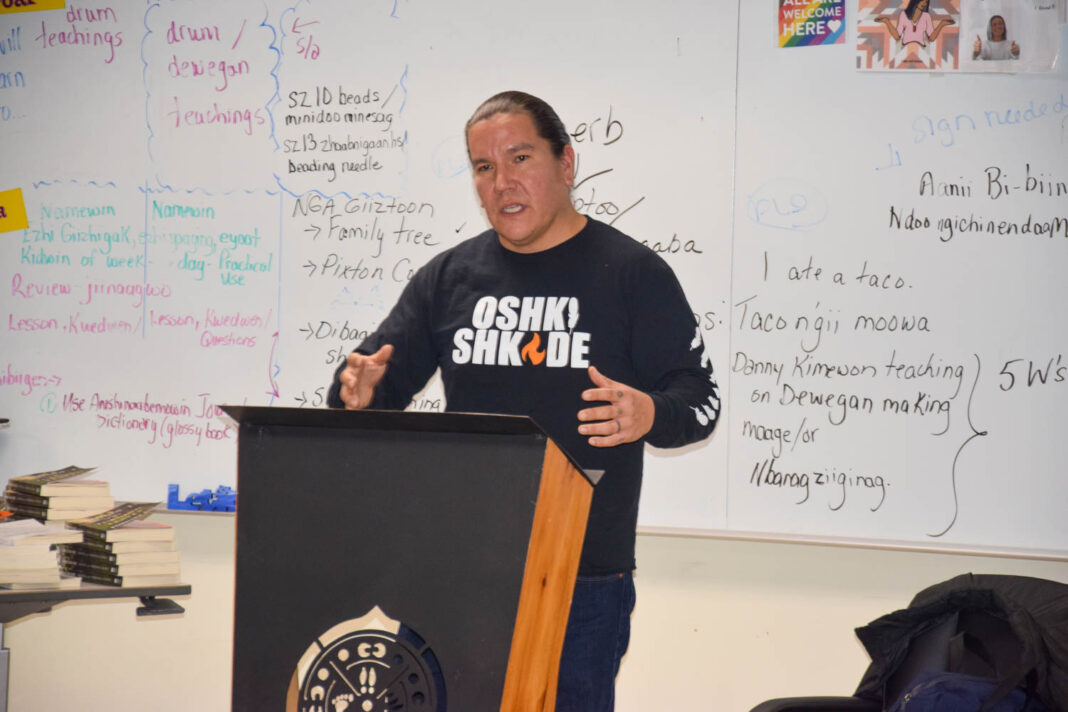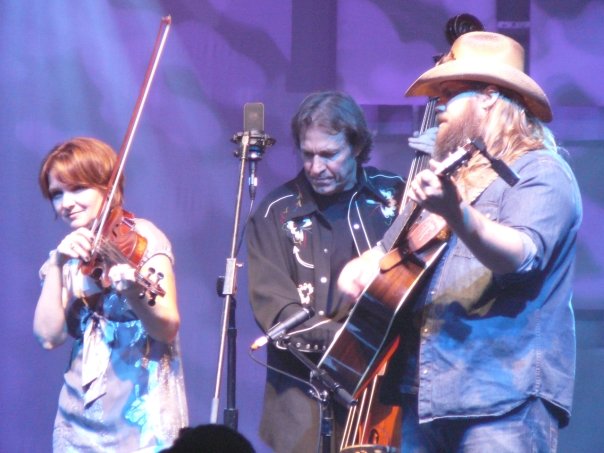WIIKWEMKOONG—Best-selling author and former CBC journalist Waubgeshig Rice dropped in to Wiikwemkoong High School recently to share a little bit about himself and his love of writing with students at the school. Mr. Rice’s second novel, ‘Moon of the Crusted Snow,’ was published in 2018 and became an instant Canadian classic and best-seller, with the New York Times lauding him as one of “the Indigenous novelists reshaping North American science fiction, horror and fantasy.”
In 2014, Mr. Rice was the recipient of the Debwewin Citation for Excellence in First Nations Storytelling from the Anishinaabek Nation. By 2018 the nascent journalist found himself as the new host of ‘Up North,’ the CBC’s local afternoon show on CBC Northern Ontario. He continues to contribute to the CBC as a guest host on the program ‘Unreserved.’
Encouraged by colleagues Mr. Rice left the CBC in 2020 to concentrate on writing and with their assistance he applied for and received Ontario Arts Council grants to enable him to pursue his writing dreams in earnest.
It wasn’t that Mr. Rice was new to writing, in fact, he revealed to his young audience that he had been writing since a very early age while growing up on the Wasauksing First Nation near Parry Sound. Writing provided him with an outlet for his creative side, while helping him to discover his own identity.
He spoke of how his early days in school writers and elders would come into his school to share their knowledge. Sent to Rosseau Lake College in Muskoka, an independent school, he was immersed in the world of ‘White’ literature, he came to believe that Indigenous people didn’t write books. “That wasn’t our world, I just thought that was the way it was, just not something we do as Anshinaabek, write novels and get published”—until one day his Auntie Elaine Kelly came to check in with him. He told her his best subject was English and about the books he was reading.
“This big, long list of White authors,” he recalled telling her. “She said, ‘oh yeah,’ the way aunties do and we started talking about other stuff.”
Later, when his birthday and Christmas came along, she began sending him books by Indigenous authors such as Richard Watermase, Lee Marigold, Louise Erdick, Richard Van Camp, Thomas King, Marilyn Demount, Murry Campbell.
“All these authors who were doing really awesome stuff back in the 80s and 90s, but I didn’t know about them at all because I wasn’t learning about them in the public school system,” he said. “When I started reading these books, especially Richard Wagamese (from the Wabaseemoong Independent Nations in Northwestern Ontario and author of Indian Horse) I thought ‘holy jeez,’ there is an Anishinaabe guy writing about Anishinaabe things.” It was a book he could hold in his hands.
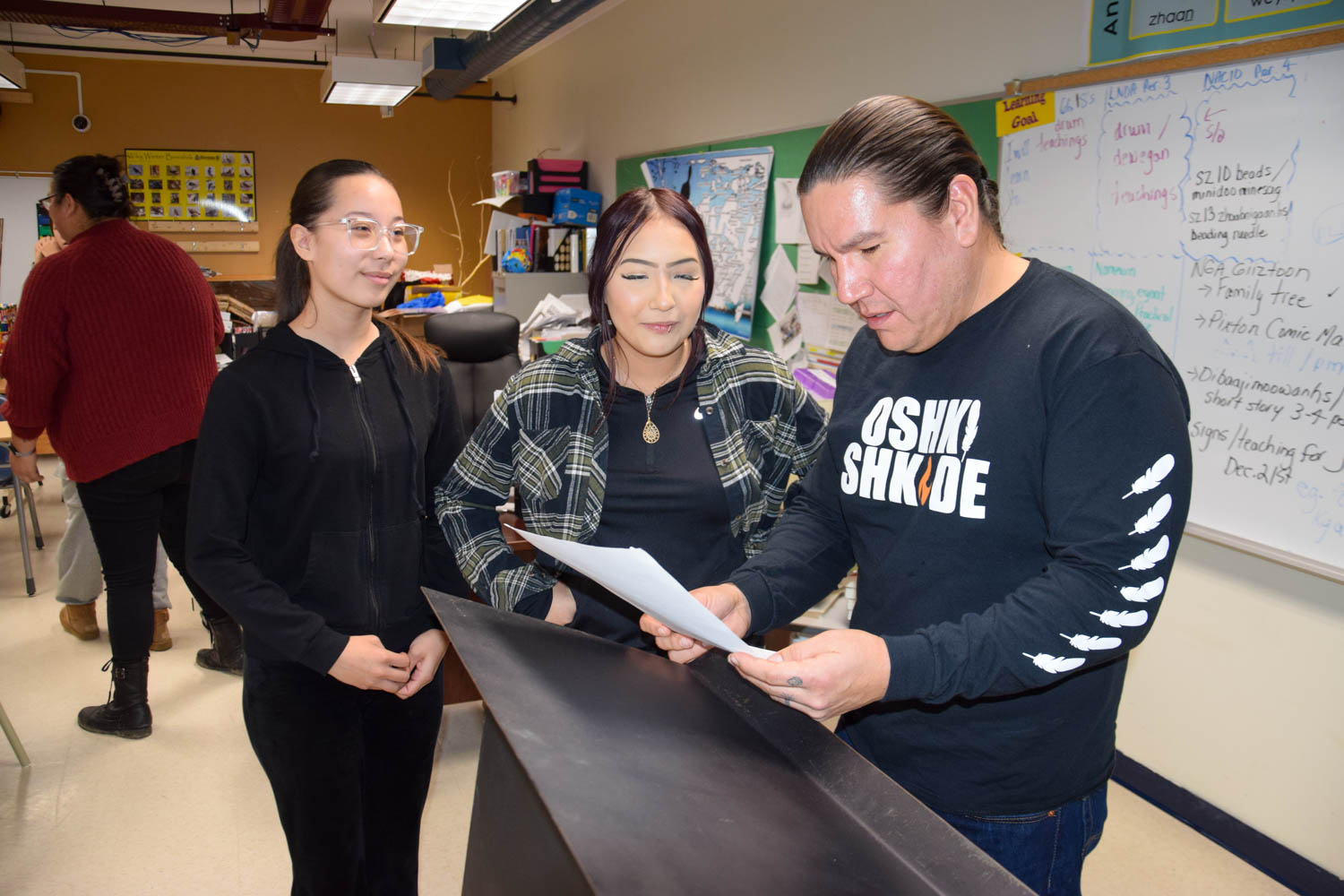
photos by Michael Erskine
“It was totally life-changing for me,” he said. “It opened my eyes to a different way of expressing myself and it validated my experiences as a rez kid. For the first time I was reading about rez stuff in a novel, it really inspired me to try and do stuff like that myself.”
He began “writing stuff down on a pad, short stories and things I noticed that interested me.” Some of those stories he wrote as a young student, revised and rewritten, became his first book, a collection of short stories.
“It’s cool to see how the world has changed,” he said. “I am excited to see the things that you will create. It’s totally different now than when I was your age. I wanted to let you know that I came from a community much smaller than yours, and I was able to get on this career path.”
Mr. Rice then read from his lates novel, ‘Moon of the Turning Leaves,’ a sequel to ‘Moon of the Crusted Snow,’ and set in the same post-apocalyptic world, 10 years later, where a group of Anishinaabe have retreated back into the bush as the technological world as we know it has come to an end as electrical power has completely disappeared. But that community enjoys elders who still have traditional knowledge.
Following his reading, students asked him questions.
The first was whether his book would be turned into a movie. Mr. Rice revealed that his novel was optioned, but that it did not come to fruition. He remains hopeful that, with this second novel, it might become a series.
Asked if writing was his only job, Mr. Rice replied that he has been fortunate that he is a full-time author now, although he does do other things such as writing tours, speaking engagements and still does some journalism work, but added with a laugh that, when it comes to writing, he intends to “ride it out as long as I can.”
Mr. Rice admitted to one questioner that he is an intergenerational Maple Leafs fan. “My dad was a fan,” he said, noting that was when they were regular Stanley Cup contenders. “They are still pretty good and exciting,” he chucked.
“What provokes your creative imagination?” asked another student. “There is a lot of things that do. What inspires me the most is being Anishinaabe,” he said. “Knowing about our ways of life. Making connections with other authors and learning about other cultures.” He noted that there are some universal aspects of life on “the rez.”
“Also, exploring questions about myself, my community,” he said. “Grabbing those little moments that mean a lot to you and resonate throughout your life. A lot of what I write about now is from things I experienced when I was your age.”
He pointed out that the outside world tends to “only know us from the bad stuff. But that it is the positive things that really make up who Anishinaabe are.” Mr. Rice stressed that writing is not the only creative outlook that is available.
Wiikwemkoong Ogimaa Rachel Manitowabi asked if some of his motivation to write the book was to encourage people to go back to the old ways of living.
Mr. Rice responded by noting how, when he was 24 and had come home to Wasauksing First Nation with his brothers to look after his parents’ home. The power went out and it lasted for a long time. Travelling into Parry Sound, they learned that it was a massive power outage impacting east side of North America.
“We were totally in survival mode,” he said. Over the several hours they checked on relatives, checked out the food stocks and went fishing. “That’s what’s on the menu from now on we thought,” he said. The brothers came to realize that in the case of the end of the world, the rez was the best place to be.
Mr. Rice advised that using images, all the senses about a particular thing you want to write about, “what you heard, what you smelled, what you tasted, not in great detail, but some details helps make things more realistic. As a writer, you want to make human connection with your reader,” he suggested.
When it comes to apocalyptic setting, Mr. Rice recalled a conversation with his grandmother about the blackout. “My grandmother said pffth… we are Anishinaabek, we have already experienced the end of the world.” His family was forced to leave the mainland and settle on Parry Island.
“Looking across the water, we could see the trees being cut down, later the other things started to happen like residential schools,” he said. Their world ended in those interaction, but they have survived and kept their traditions despite it all.
Mr. Rice took the students through the three-year process of writing his novel, six months of research, then creating an outline and then endless revisions and rewrites. “The original draft was a lot bigger than this,” he said, holding up a copy of his new book.
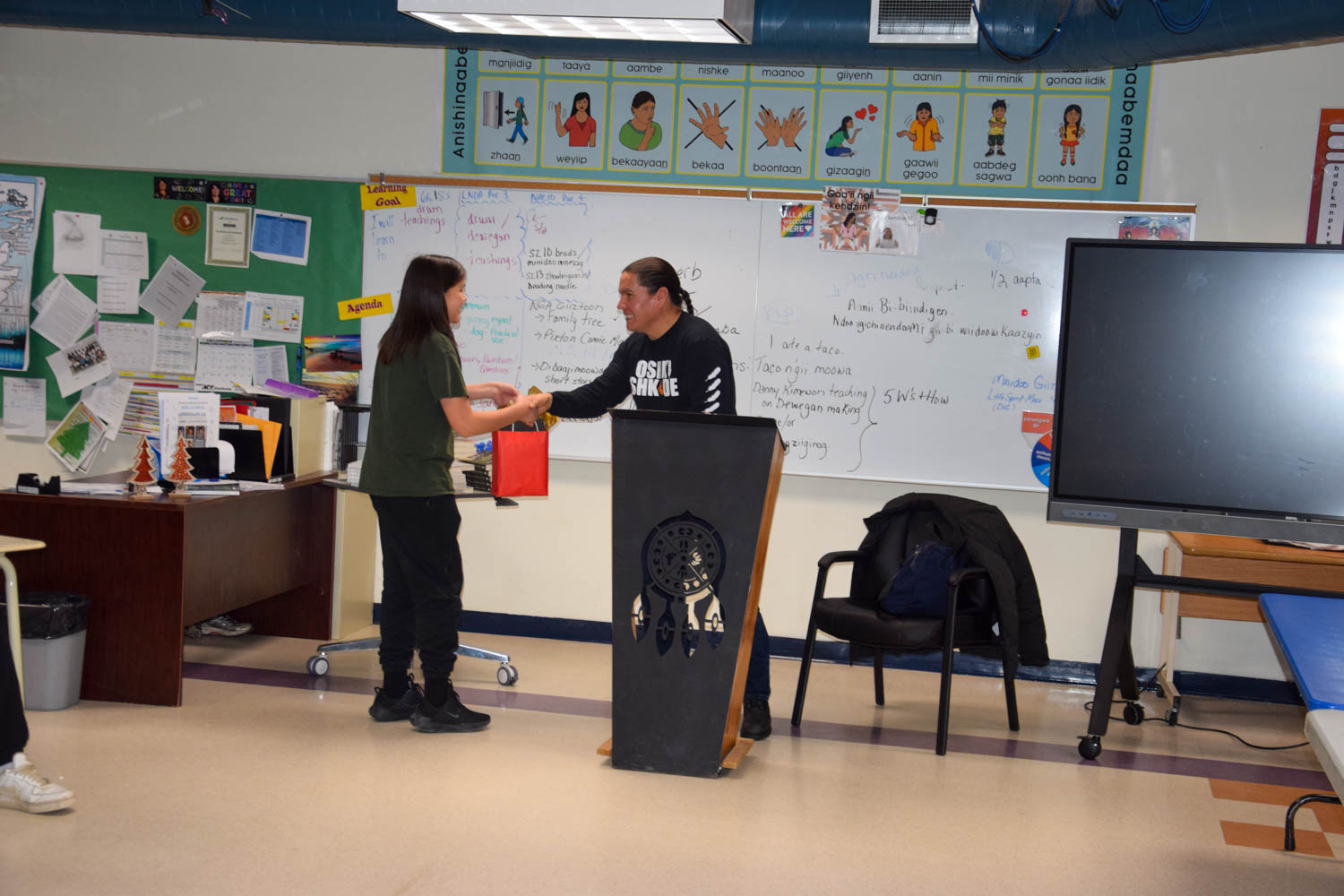
Following his presentation, Liam Wassegesso presented Mr. Rice with a gift from the students of Wiikwemkoong High School and thanked him for his inspiration. Ogimaa Manitowabi also presented Mr. Rice with a welcoming gift from chief and council.
Mr. Rice said that the most important part of the process was having the opportunity to come and share his experiences with youth the way others had for him when he was a student.
Vice-principal Cameryn Beaudry said how proud he was that the school was able to host such an accomplished author “and for our students to be able to delve deeper into what is out there. This is a great way to show them how to segue into journalism and writing. For our kids to be able to see that, kudos to Dwayne Animikwan and Ms. (Natelie) Parrington for making this happen and to Mr. Rice for coming out today.”
Principal Harold Fox said, “Miigwetch to Waubgeshig Rice for helping us here at Wiikwemkoong High School. We are so proud of his accomplishments, not only as a journalist, but also as an author, and discovering an Anishinaabe point of view and lifelong learning.”
Throughout Mr. Rice’s presentation, the students were particularly attentive and engaged. The general consensus of Mr. Rice’s presentation from students approached for comment was, in a typical teenage assessment, “it was good.”
